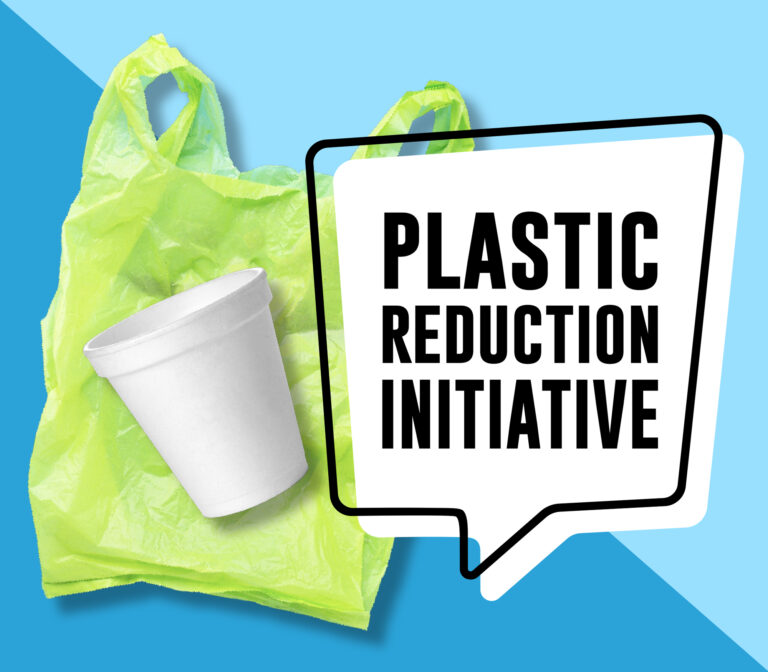In October 2022, following preliminary community-led engagement, sustainability staff were directed by City Council to conduct wide-reaching public engagement and research to inform a recommendation on single-use plastic reduction in our community.
Sustainability staff utilized data from the Equity and Inclusion Department and Communication and Public Engagement (CAPE) Department’s analyses of the preliminary efforts to plan a 4-phase engagement and analysis process. Each phase focused on building on lessons learned, refining questions and strategizing to inform re-engagement in pursuit of an equitable and comprehensive inquiry process. The resulting engagement report aims to lift up the process that staff utilized to develop evolving strategies to solicit feedback from a representative cross section of Asheville’s residents and impacted business owners.
Phase 1 – Engagement with City Staff: December 2022 – January 2023
The Sustainability Department initiated engagement with City staff through an online survey and three “Plastic Cafe” in-person events open to all staff members. The intention behind this strategy was to conduct a preliminary landscape assessment to better understand potential impacts to city operations, challenges with implementation and test the effectiveness of survey questions. Key takeaways found in phase 1 were:
- 80% of survey respondents support a plastic reduction ordinance with plastic bags and expanded polystyrene [Styrofoam™]
- 83% of respondents reported seeing plastic litter on streets or sidewalks after garbage collection with the majority reported on roadways/sidewalks and rivers
- Clear communications on details of products included in any adopted regulation, enforcement strategy, and timeline is key to compliance
Phase 2 – Community-wide Engagement: February – June 2023
The next phase of engagement focused outreach efforts externally and staff developed two public input surveys, one for businesses and one for residents. These surveys were built on key themes identified through phase 1 staff engagement, refinement of questions based on staff surveys responses and input from community-based organizations such as Plastic Free WNC, Asheville Independent Restaurant Association, Go Local Asheville, Sustainability Advisory Committee and Neighborhood Advisory Committee.
The surveys were available online, in print and in three languages (English, Spanish and Russian). Multiple city departments, Buncombe County and community-based organizations assisted in presenting the survey opportunity to neighborhood associations, transit riders, business groups, etc.
Key takeaways from the surveys included:
- Further established plastic waste as unresolved issue in current sanitation systems
- Established general support (80%) among residential respondents for action to curb single-use plastic waste
- Indicated key businesses to engage with based on sources of single-use plastic (#1 grocery stores and #2 restaurants)
- The majority of business respondents to the initial survey did support a ban on both single-use plastic bags and Expanded Polystyrene, however:
- The majority of business survey respondents indicated that they did not provide bags or to-go containers to their customers (54% indicated no products distributed, 70% combined total for not impacted compostable, paper, and/or utensils). Only 14% indicated distributing plastic bags and 3% expanded polystyrene disposable foodware products.
- 74% reported anticipating “No” or “Low” economic impact on their business from a single-use plastic ban
Phase 3 – Focused Community Engagement: (June – August 2023)
City staff compared Asheville’s demographic data from the US Census against the percentages represented in the initial residential survey responses. Based on this comparison, the following demographic categories were underrepresented in the initial survey response:
- Black, Indigenous, People Of Color (BIPOC) residents
- Low-income residents
- Residents over 65 and under 35
- Residents in the following zip codes: 28715, 28704, and 28732
- Renters
To enhance business outreach to reach potentially impacted businesses, staff used data collected from the residential survey to identify primary sources of these products (grocery stores and restaurants) and focus outreach to those businesses.
Many of these groups were also identified in the Equity and Inclusion and Communication and Public Engagement (CAPE) Department’s analysis as missing from prior community led engagement efforts. Thus, staff developed and implemented the following focused engagement strategies to better reach under-represented communities and businesses:
- targeted direct residential and business mailing
- 1:1 outreach to potentially impacted businesses
- ground team 1:1 residential engagement
Key takeaways from the focused engagement included:
- Lower overall support from residents for ban on single-use plastic bags and Expanded Polystyrene, average of 65% support for full ban vs 80%, residents of color reported lowest support (57%)
- Increased support from residents for voluntary programming, average 18% vs 6%
- Lower overall support from businesses for ban on single-use plastic bags and Expanded Polystyrene, 56% vs 72%
- Increased support from businesses for voluntary programming, 20% vs 9%
- Increased in percentage of businesses reporting “high impact” of a ban, 20% vs 10%
- More detailed vendor/supplier information provided for additional research on alternative products and cost implications
Phase 4 – Engagement Analysis: August – October 2023
Staff analyzed all input from the stakeholder engagement effort which is summarized above and documented in more detail in this report. Staff compiled and presented stakeholder engagement, project research and data analysis on potential policy impacts to the Sustainability Advisory Committee on May 17, 2023 and September 20, 2023 and the Environment and Safety Committee on May 23, 2023 and September 26, 2023. Please check the project page for next steps!
The Sustainability Department would like to extend a big thank you and gratitude to the over 7,000 individuals and organizations that participated in this engagement. We value your time and input!
